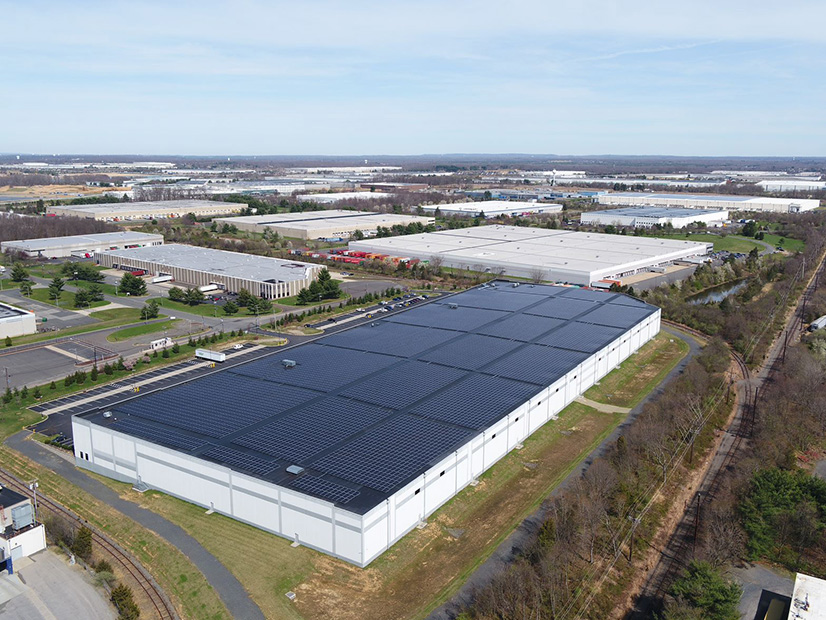New Jersey’s Economic Development Authority (EDA) on Friday began accepting applications for a new $80 million fund designed to make matching loans of up to $10 million to small businesses seeking to make clean energy investments.
The project, called New Jersey Clean Energy Loans (NJ CELs), is designed to assist businesses that develop clean energy infrastructure, install or purchase clean energy improvements in an existing business, manufacture clean energy products, or offer clean energy services.
The program defines “clean energy” broadly, ranging from solar and wind power to carbon capture technologies, hydroelectric and wave power to fuel-cell based storage.
“NJEDA loans must be matched at least dollar for dollar with capital from a financial institution,” the EDA said in a release, adding that the program aims to “unlock capital for small businesses and start-ups, [and] catalyze the deployment of clean energy in New Jersey.”
The program is one of three climate change impact programs launched by or in development at the EDA, the main architect of the financial structures and programs underpinning Gov. Phil Murphy’s aggressive clean energy agenda. Together, the three programs could make available hundreds of millions of dollars in funding for climate change projects.
The agency is assessing public comments, with a May 15 deadline for submissions, and refining the rules for a program known as the Garden State Commercial Property Assessed Clean Energy (C-PACE) program. It will use a strategy similar to a property assessment to help property owners making renewable energy, energy efficiency, water conservation, and certain types of resiliency-related improvements access financing to fund their projects.
The EDA is also developing a $40 million “Green Fund,” which Murphy highlighted in his Feb. 28 budget speech but about which he has provided little detail. The governor’s budget proposal book released the same day says the fund will aim to leverage both private capital and private funds, and is designed to “attract up to $280 million in private capital to advance projects to advance the State’s new and bold environmental goals.”
“The Green Fund will support growth of clean energy technologies aimed at reduction or avoidance of greenhouse gases (GHG) and will help deliver on New Jersey’s environmental and economic development goals with a focus on overburdened communities,” EDA spokeswoman Rachel Goemaat said. “The Green Fund will be focused on sustainable infrastructure opportunities and represents a new approach in the clean energy marketplace in the state.”
Wide-ranging Scope
EDA officials say NJ CELs is looking to assist businesses of all kinds to initiate investments that work toward mitigating climate change.
“The program is designed to support small businesses and catalyze the deployment of clean energy in New Jersey,” Marta Cabral, senior project officer for clean energy at the EDA, told a pre-launch forum. “And we are using this program to support clean energy projects as well as the creation and expansion of clean energy businesses in the state.”
That expansive vision is reflected in the flexible criteria for defining which businesses are eligible for participation in the program.
“You could be seeking finance for a clean energy infrastructure project — let’s say solar plus energy storage distributed energy resource projects, for example,” Cabral said. “You could also be seeking financing to install or purchase clean energy improvements at an existing facility.
“So, if you’re upgrading to high efficiency boilers, for example, or you’re switching to electric vehicles, that could potentially qualify, even if … you’re not a clean energy business,” she added.
Eligible businesses can seek loans for between $250,000 and $10 million, with a matching loan from a financial institution. The EDA’s portion of the loan will be pegged at 3 percent points below the financial institution’s rate, with an additional 1 percentage point reduction each for minority-, women- and veteran-owned businesses — allowing for an additional cut of up to 3 percentage points for a business that fits into all three categories.
In addition, Cabral said, businesses “are also eligible for a 10% loan forgiveness if the project results in at least one job being created per $100,000 of the total loan amount.”
The list of 25 participating institutions ready to make loans under the program range from giants such as Bank of America and JP Morgan Chase, to smaller entities such as Cross River and Peapack-Gladstone banks.
Repayment Through Assessments
The C-PACE program aims to provide a new form of financing for climate change-related projects for the state, enabling property owners to leverage the value of the property by placing a special assessment lien on it.
The strategy will allow the owners of commercial, industrial, agricultural, and certain multi-family residential buildings to take out financing that would be repaid through an assessment to their municipality, in the same way that property tax and sewer or water bills are.
“Because the payment is secured by a senior lien, C-PACE projects are seen as less risky than typical loans, allowing capital providers to lend at lower interest rates than would otherwise be the case,” according to the agency’s explanation of the program. The repayment obligation is tied to the property and is transferred to any buyer.
“Due to the security arrangements for the loan, capital providers are willing to extend loans that are longer in duration,” the agency said, adding that “the longer loan terms result in lower periodic debt service payments, making it easier for energy efficiency, water conservation and renewable energy-related C-PACE projects to be cash flow-positive from the outset.”



